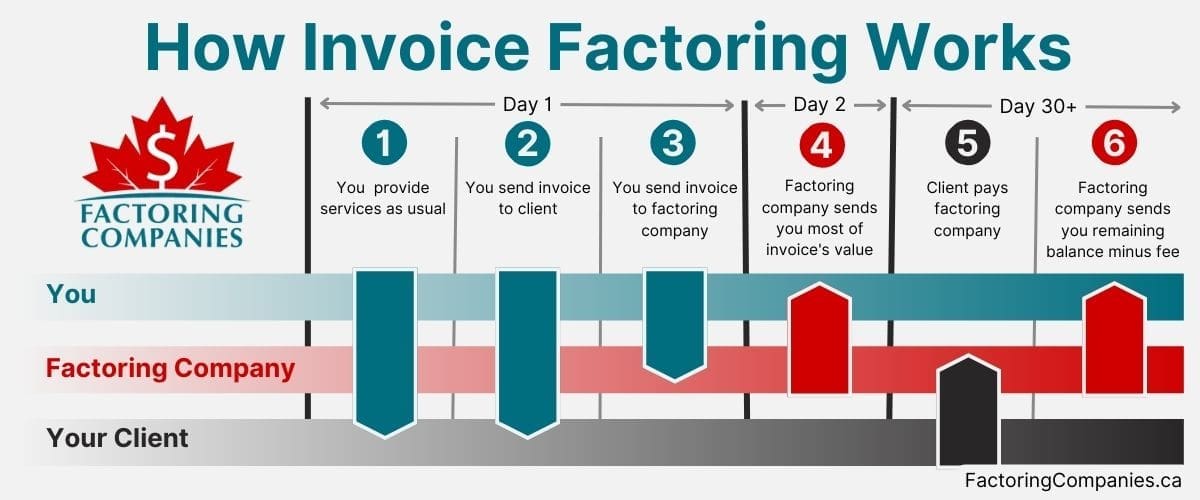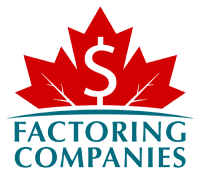
Invoice factoring is not a loan, so it’s not subject to the same laws that traditional funding methods like loans are. This can be a huge advantage for businesses because it makes it easier to qualify for funding, speeds up payments, and allows for more flexible funding. However, there are still invoice factoring regulations that businesses should be aware of. On this page, we’ll review some legal aspects of invoice factoring and how they’ll impact you and your clients.
How Invoice Factoring Works
Before we get into regulatory compliance in factoring, let’s quickly cover a few basic details about how factoring works.
Invoice factoring involves selling your unpaid B2B invoices at a discount to a third party, known as a factor or factoring company. The factoring company immediately advances you most of the invoice’s value and takes over the collections process for you. This part of the process usually operates much like working with a third-party billing agency versus a collection agency – customer service is a priority.
When your customer pays their invoice, the factoring company sends you the remaining balance minus a small factoring fee. At this stage, the matter is closed. Your customer has paid in full, and you don’t owe anything for your advance.

Invoice Factoring vs. Invoice Financing
Invoice factoring and invoice financing both turn your unpaid invoices into cash. The key difference is that you’re selling your invoices when you factor and taking out a loan using invoices as collateral when you finance. This also means financing doesn’t come with the same perks. For example, you’re typically responsible for collecting customer balances and must send the financing company a payment with interest and fees when your client pays you.
Notification vs. Non-Notification Factoring
While factoring is primarily an agreement between you and your factoring company, the relationship is often referred to as a “factoring triangle” because your client is involved, too. Under a traditional factoring agreement, you sign a contract indicating the receivables are assigned to the factoring company, and your client signs to show understanding that they’re aware the factor owns the invoices and remits payment to the factor. Because your client receives a written agreement, this arrangement is called “notification factoring.”
As with every aspect of factoring, this is handled with care. The wording of the notices varies, though it usually includes a reference as to how the new arrangement benefits them. For example, some companies use the wording “to serve you better” or “to continue providing you with extended payment terms.” Most large businesses have seen these notices before, so they’re not unusual or cause for concern.
Some businesses are still concerned about this process or don’t want their customers to know they’re factoring. Non-notification factoring allows for this arrangement.
Recourse vs. Non-Recourse Factoring
Seven percent of Canadian B2B invoices become bad debt on average, according to Atradius. Your factoring company will run credit checks on your clients and guide you on how much trade credit you can extend without exposing your business to unnecessary risk. This likely means your bad debt will be under nine percent, if not totally eliminated. However, there is always some risk of non-payment.
In a recourse factoring agreement, your business is responsible for paying the factor, even if the client doesn’t pay the invoice. Each company has its own policies, though most will allow you to submit an invoice of equal value in its place or will take the balance from your reserve rather than having you pay the funds back. This is the most popular method because it’s more economical, and risk tends to be low.
In a non-recourse factoring agreement, the factor absorbs the loss. Your business does not need to take any action or pay anything back. Not all factoring companies offer non-recourse factoring, and it’s the more expensive of the two options, so it’s leveraged less often.
Improve Cash Flow with Invoice Factoring in Canada
Invoice factoring offers Canadian businesses a flexible solution to improve cash flow without taking on debt. By selling unpaid invoices to a factoring company in exchange for an immediate cash advance, businesses can maintain smooth operations and cover expenses without waiting for customers to pay. This process is especially helpful for small businesses that face cash flow problems due to delayed payments. Temporary staffing businesses, where maintaining consistent cash flow is vital for smooth operations and timely payroll, can benefit immensely from customized factoring solutions that address industry-specific financial challenges.
Unlike loans, factoring does not create new liabilities on the balance sheet, and businesses aren’t burdened by long approval processes. The factoring company provides a cash advance based on a percentage of the invoice value, allowing businesses to cover short-term needs and focus on growth. Factoring services in Canada allow businesses to convert accounts receivable into working capital, addressing cash flow concerns and helping sustain ongoing operations.
Understanding the Legal Framework of Invoice Factoring
While invoice factoring laws are typically handled at the provincial level, most provinces have opted into the same legislation, and the Supreme Court of Canada has issued a few rulings, too. There are a few variances for specific industries as well. Because of this, the following information shouldn’t be taken as a definitive source on financial regulations for factoring or legal advice. Connect with your factoring company or local legal professional for information specific to your situation.
Key Invoice Factoring Regulations in Canada
Invoice factoring laws primarily relate to the ownership of invoices, communication, and collectability.
Factoring Agreement Laws
Factoring agreements are one area in which the Supreme Court of Canada has stepped in, as explained by Miller Thompson Law. All factoring agreements must contain details relating to the following:
- Purchasing a business’ book debts.
- Taking over and administration of a business’ credit control function relating to that debt.
- Providing a business with immediate financing in the amount of a specified percentage of the debt.
Personal Property Security Act (PPSA)
You’ll sign a security agreement as you get set up with your factoring company. This agreement essentially states that your current and future receivables are being pledged as an asset and secured as advances. Factoring agreements vary, so this should not be taken to mean you must factor all your invoices. It simply means that the factoring company has a right to your receivables if an invoice goes unpaid. In other words, it spells out some of the expectations associated with recourse factoring.
However, as covered earlier, other financial products, such as invoice financing, can involve using your receivables as collateral. That means it’s technically possible for two funding partners to have a claim on the same asset without some legal protections in place.
The PPSA addresses both of these areas. It’s a broad piece of legislation that governs debtors who use their property as security for the repayment of their debt to a creditor. Because your receivables are considered security, the PPSA applies to factoring agreements.
Under the PPSA:
- Your client must pay you any balances until they receive appropriate notice that the accounts receivable have been assigned to the factor.
- Your client can request proof of the assignment from the factor. If the factor fails to provide proof, the customer can pay you directly instead.
- Factoring companies must register a statement claiming a security interest in your accounts receivable to ensure another funding partner or creditor cannot make a claim against them.
General Contract Law
Factoring agreements are fundamentally contracts between the business and the factor. These contracts are subject to general contract law principles in each province or territory, ensuring fairness and enforceability.
Assignment of Debts Act
The Assignment of Debts Act governs the legal validity of transferring debts (like invoices) to another party (the factor). It ensures certain procedures are followed for a valid assignment and clarifies factors’ rights to collect payment from the customer.
International Factoring Laws

Depending on the factoring company you partner with, you may be able to factor invoices that are payable by your international clients. Each jurisdiction determines laws. However, many factoring companies that provide these services are members of the International Factoring Association (IFA), an organization that helps establish factoring industry standards globally.
While participation in the organization is optional, those who belong to it must follow a code of ethics, which can impact contracts and factor behaviour. For instance, members must be honest and maintain accounting systems to track transactions, the IFA notes. They must also help you move to another factoring company if you wish. Additionally, they must follow all local, state, and federal laws.
How Factoring Companies Handle Outstanding Invoices
Factoring companies across Canada specialize in managing outstanding invoices, offering business owners a way to convert unpaid invoices into immediate cash. After the business sells its invoices to the factoring company, the factor assumes the responsibility for collecting payments from customers, ensuring cash flow remains uninterrupted. This allows businesses to focus on daily operations instead of managing customer payments. Ontario-based businesses, in particular, can benefit from working with local Ontario factoring companies that understand the province’s economic nuances and industry demands, providing tailored solutions to help businesses thrive.
Factoring companies handle all aspects of collections, including sending invoices and reminders to slow-paying customers. This service helps businesses avoid cash flow problems caused by delayed payments while reducing the administrative burden. Factoring companies charge a fee based on the invoice amount, but the benefits of immediate funding outweigh the cost for many businesses. By using factoring, companies across Canada can stabilize cash flow and reduce reliance on slow-paying clients.
Compliance in Invoice Factoring
Aside from not pledging your receivables to another entity and doing your part to ensure your factor is paid, invoice factoring compliance mostly rests on your factor’s shoulders. However, understanding invoice factoring regulations makes understanding your factoring agreement and why your factor takes certain actions easier.
Navigating Regulatory Updates in Factoring
Particularly if your factoring company belongs to a trusted organization such as the IFA, your factor will typically stay on top of regulatory updates in factoring, so you don’t have to. However, it’s always a good idea to be on the lookout for updates and responsive when the factor needs to make changes to comply with new regulations. This will help ensure that you don’t experience any unnecessary payment delays.
Receive a Complimentary Factoring Quote
The roots of factoring can be traced back to ancient times, so it’s no surprise that invoice factoring regulations occasionally shift. However, it remains one of the most trusted ways for businesses to obtain working capital. If your business can benefit from accelerated payment on B2B invoices, request a complimentary factoring quote.

About Factoring Companies Canada
Related Articles
Get an instant factoring estimate
Factoring results estimation is based on the total dollar value of your invoices.
The actual rates may differ.
CLAIM YOUR FREE FACTORING QUOTE TODAY!
PREFER TO TALK?
You can reach us at
1-866-477-1778
Get an instant factoring estimate
Factoring results estimation is based on the total dollar value of your invoices.
The actual rates may differ.
CLAIM YOUR FREE FACTORING QUOTE TODAY!
PREFER TO TALK? You can reach us at 1-866-477-1778











